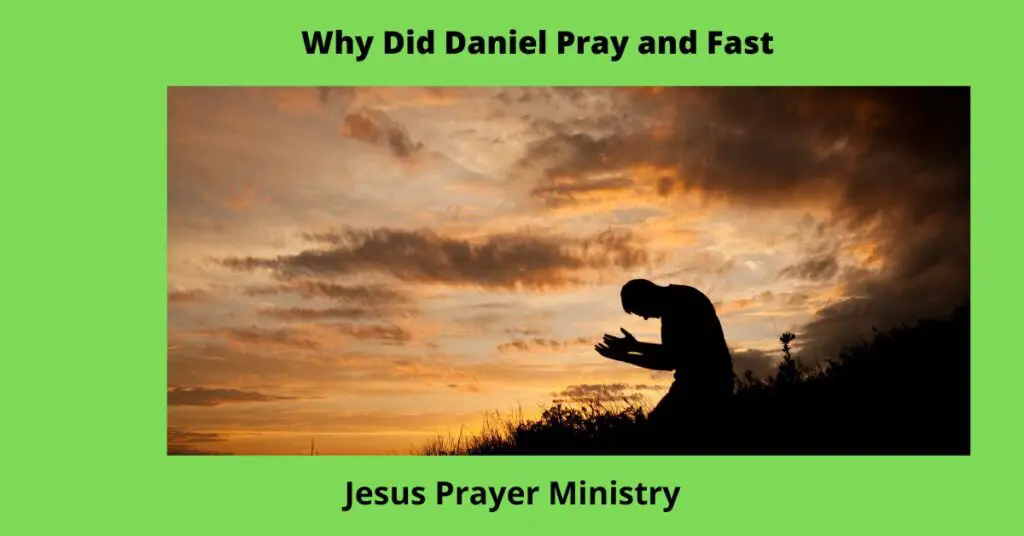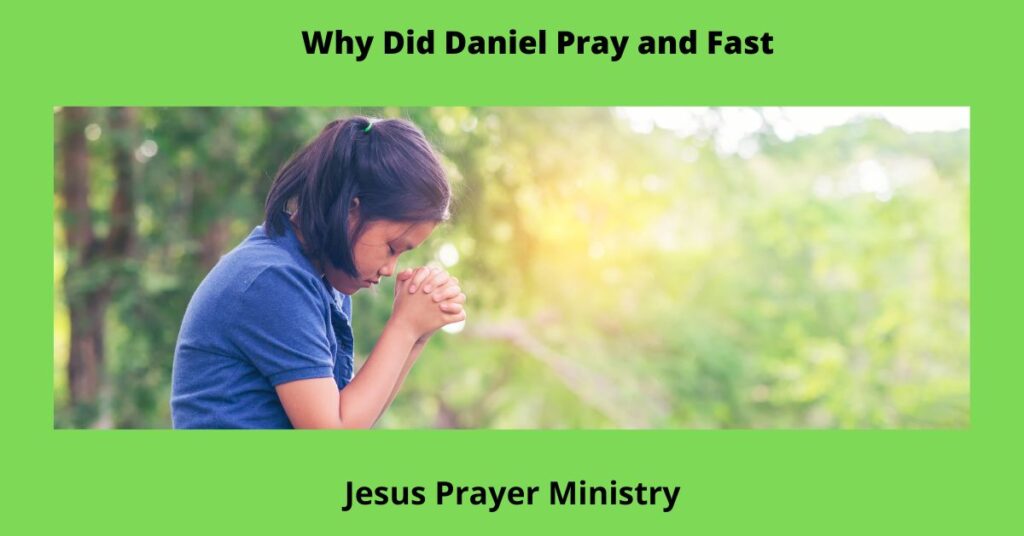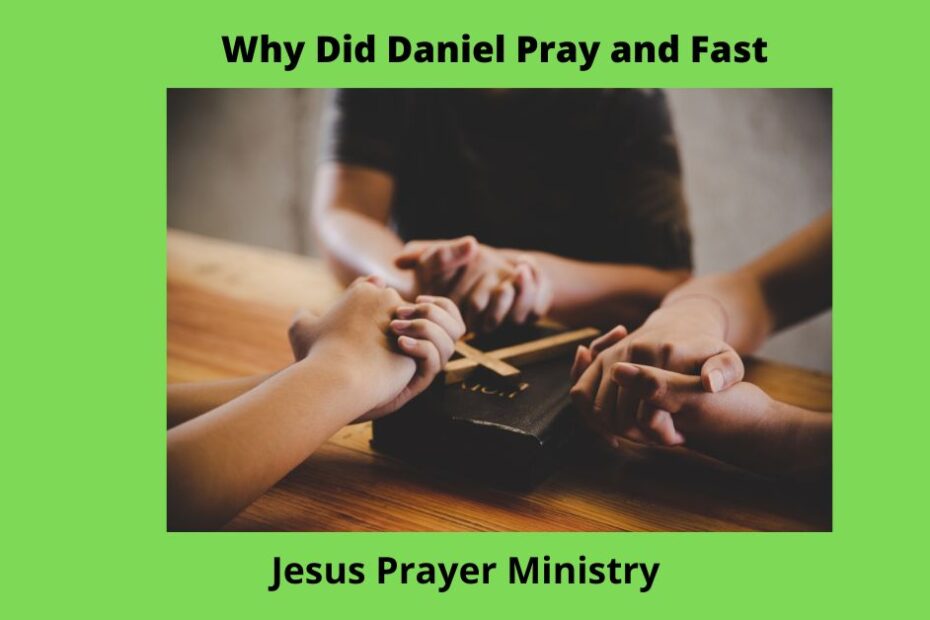Why Did Daniel Pray and Fast
In the Bible, Daniel is a powerful example of someone who prayed and fasted regularly. He knew that this was the key to maintaining his relationship with God and staying close to Him. There are many benefits to prayer and fasting that we can learn from Daniel’s example. In this blog post, we will explore some of those benefits and see why it is so important for us to pray and fast regularly as well.
Who was Daniel?
Daniel was a young man that demonstrated tremendous faith and perseverance. He was taken captive by the Babylonians and forced to live in a foreign land. Daniel could have easily become bitter and resentful at his situation.
However, he chose instead to remain faithful to God. He continued to pray and fast even though it was not required of him by his captors.
Daniel was a Hebrew prophet who lived during Babylonian captivity. He is best known for his prophetic visions, which foretold the coming of the Messiah. Why Did Daniel Pray and Fast

He also wrote the book of Daniel, which describes the end times and the Day of Judgment. Daniel was a righteous man who remained faithful to God even in the midst of great trials. He was thrown into a den of lions but was protected by God and emerged unscathed.
He also survived a fiery furnace when he refused to worship false idols. Because of his faithfulness, Daniel was greatly blessed by God and became one of the most famous prophets in history.
What Faith was Daniel Raised with?
Daniel was raised in the faith of his fathers, which was the Hebrew faith. He was probably born in Jerusalem and would have been exposed to the teachings and practices of this religion from a young age. As he grew older, he would have deepened his understanding of and commitment to his faith.
This would have been particularly true after he was taken captive by the Babylonians and forced to live in a foreign land. Despite being far from home, Daniel continued to practice his religion and remained loyal to his beliefs.
This is evident from the stories of how he refused to eat unclean food and how he prayed to God despite the risk of punishment. Daniel’s faith played a major role in shaping his character and served as a source of strength during difficult times.
What is Prayer?
A prayer is an act of communication with a god or other object of worship. It may take the form of a petition, asking for specific things from the deity, or it may simply be an expression of praise or thanksgiving. Throughout history, people have used prayer as a way to request guidance, strength in times of difficulty, or healing from sickness or injury.
In many religions, prayer is seen as a way to connect with the divine and receive spiritual nourishment. For some people, prayer is primarily a private practice, while others see it as an act of public worship.
There is no single correct way to pray, and individuals may find that their needs change over time. Ultimately, prayer is a deeply personal act that can provide comfort, hope, and strength.
How Many Religions have Prayer and Fasting as part of their Faith?
Prayer and fasting are two of the most commonly practiced religious rituals across the world. Though the specific customs may vary, both prayer and fasting are typically seen as ways to connect with a higher power and to achieve a state of spiritual focus and purity. As a result, they are commonly practiced within many different faith traditions.

For some religions, such as Islam and Christianity, prayer and fasting are deeply intertwined. In Islam, for example, there is a special month-long fast called Ramadan during which Muslims refrain from eating or drinking from dawn to dusk.
This period of abstinence is meant to help Muslims focus on their faith and to become closer to Allah. Similarly, Christians often fast during Lent, a 40-day period leading up to Easter Sunday. During this time, Christians may give up certain food items or activities as a form of self-denial and spiritual discipline.
While prayer and fasting are often seen as serious or somber activities, they can also be experienced as joyful and celebratory. In some traditions, such as Sufism, prayer is seen as a way to connect with the divine through music and dance.
Similarly, many Hindus fast during special festivals like Navratri, during which they give thanks for the bounty of the harvest. Regardless of how they are practiced, prayer and fasting are two of the most universal religious rituals.
Why Do People Pray and Fast?
People pray and fast for many different reasons. For some, it is a way to show their dedication to their faith and to request guidance or strength from a higher power.
Others may use prayer and fasting as a way to purify their bodies and minds or to prepare for a special religious event or ceremony. In some cases, people may fast as a sign of mourning or repentance. Whatever the reason, prayer and fasting are typically seen as positive and beneficial activities.

How Often do Jewish People Pray?
Jewish people pray several times a day, every day. The Amidah, or standing prayer, is the central prayer of Jewish liturgy and is recited three times a day: once in the morning, once in the afternoon, and once at night.
Morning prayers also include the Shema, a declaration of faith in God that is recited twice daily, once in the morning and once at night. In addition to these regular prayers, there are also special prayers for Shabbat (the Sabbath) and holidays.
On Shabbat, Jews attend synagogue and recite additional prayers. And on holidays like Passover and Rosh Hashanah, Jews participate in extended services that include many specific prayers. Jewish prayer is thus a central part of daily life, providing a way to connect with God throughout the day.
How Did Daniel end up in Lions Den?
The Book of Daniel tells the story of how the prophet Daniel ended up in the lions’ den. As the Babylonian Empire began to crumble, King Darius decided to solidify his power by appointing 120 satraps to rule over his kingdom.
However, when Daniel refused to bow down to the king’s image, he was thrown into the lions’ den as punishment. Fortunately, God protected Daniel from harm, and he was able to survive the night unscathed.
The next morning, when King Darius saw that Daniel was still alive, he immediately threw his accusers into the den, where they were devoured by the lions. This miraculous story serves as a reminder of God’s power and faithfulness.
Prayer and fasting should not be taken lightly
Anyone who has ever attempted to fast knows that it is not an easy feat. abstaining from food and drink for extended periods of time takes discipline and self-control. For many people, the hardest part of fasting is not the physical hunger, but the mental and emotional temptations.
When we are deprived of food, our thoughts often turn to food. We may start to feel irritable, lightheaded, and unfocused. This is why prayer and fasting should not be taken lightly.
The act of willingly submitting ourselves to a difficult challenge can help to train our minds and bodies to resist temptation and withstand hardship. In addition, prayer and fasting can help us to develop a greater appreciation for the blessings we often take for granted, such as the ability to free from hunger or thirst.
When we pray and fast with a sincere heart, we open ourselves up to God’s grace and mercy, and we allow Him to work in us in ways we never thought possible.
Prayer and fasting are important spiritual disciplines that should not be taken lightly. When we pray, we are communicating with God and asking for His guidance and wisdom. When we fast, we are denying ourselves food or water for a period of time in order to focus on our relationship with God.
Both disciplines require discipline and self-control, and both can be difficult at times. However, prayer and fasting are essential practices for Christians, and they should be approached with humility and reverence. taken lightly, prayer and fasting can become meaningless rituals.
But when approached with a humble and faithful heart, they can be powerful tools that help us to grow in our relationship with God.

Why Did Daniel’s Faith lead him to Pray and Fast?
Daniel’s faith led him to trust in God’s power and care, even when he was facing difficult circumstances. Daniel knew that God was able to protect him from the lions, and he also knew that God would hear his prayers.
Furthermore, Daniel’s fasting showed his humility and dependence on God. He was willing to sacrifice his own physical needs in order to seek God’s guidance. By fasting and praying, Daniel demonstrated his complete trust in God’s ability to provide for him, even in the midst of danger. This act of faith ultimately led to Daniel being protected from harm and receiving wisdom from God.
Why Did Daniel pray for Wisdom and Understanding?
Daniel was a man of great wisdom and understanding. He was able to interpret the king’s dream, which no one else could do. Daniel knew that the dream was from God and that it had a message for the king. He prayed for wisdom and understanding so that he could interpret the dream and tell the king what it meant.
Daniel’s prayer was answered, and he was able to interpret the dream. The interpretation led to an important decision by the king that saved many lives. Daniel’s wisdom and understanding came from God, and his prayer was an act of faith. faith. Faith is believing in something even when you cannot see it. For example, you cannot see the wind, but you know it is there because you can see the effects of it.
In the same way, we cannot see God, but we know he is there because we can see the effects of his love in our lives. When we pray for wisdom and understanding, we are asking God to help us see things that we cannot see on our own.
We are asking him to help us understand things that are hard to understand. We are asking him to help us make wise decisions. When we pray for wisdom and understanding, we are showing our faith in God. We are asking him to help us, even when we do not know what to do.
Prayer and fasting are powerful tools that can be used for any purpose
Just as our bodies need food and water to function properly, our souls need spiritual sustenance as well. Prayer and fasting are two powerful tools that can help us to connect with the divine and explore our own spiritual nature.
When we pray, we open ourselves up to receiving guidance and wisdom from a higher power. Fasting serves as a way to purify our bodies and minds and focus our attention on our spiritual journey. In addition, both prayer and fasting can be used for any purpose, whether it is seeking guidance for a difficult decision or asking for strength in times of trial.
By taking advantage of these tools, we can deepen our understanding of ourselves and our relationship with the world around us.
Prayer and fasting are two powerful spiritual tools that can be used for any purpose. When we pray, we are asking God to intervene on our behalf and help us to achieve our goals. When we fast, we are denying ourselves food and drink in order to focus our attention on God and His will for our lives.
Both prayer and fasting can be used to achieve physical, mental, and spiritual objectives. For example, we may use prayer and fasting to gain strength during difficult times, to overcome temptation, or to gain wisdom and guidance. No matter what our goal may be, prayer and fasting are powerful weapons that can help us to achieve it.
How are Prayer and Fasting Powerful Tools that can help us Today?
Throughout history, people of all cultures and religions have engaged in fasting as a way to physically and spiritually cleanse themselves. When done correctly, fasting can help to improve our mental and physical health in a number of ways.
For example, it can help to boost our immune system, improve our digestion, and even promote weight loss. However, fasting is not just about the physical benefits. It can also be an incredibly powerful spiritual tool. When we fast, we are able to step away from the distractions of the world and focus on our connection with the divine.
We can quiet our minds and open ourselves up to hearing the voice of God. In addition, fasting helps us to develop self-control and discipline, two qualities that are essential for living a life that is pleasing to God. For all of these reasons, fasting is a powerful tool that can help us today
What 7 Bible Verses tell about Daniels’s Prayer Life?
Daniels’s prayer life was ver powerful these 9 verses reveal that;
- “And now, O Lord, listen to the prayer of your servant and to his pleas for mercy, and give ear to the cry of anguish that I am praying before you today.” – Daniel
- “I set my face toward the Lord God to make petition by prayer and supplications, with fasting, sackcloth, and ashes.” – Daniel
- “I turned my face to the Lord God, seeking him by prayer and supplication with fasting and sackcloth and ashes.”- Daniel
- “Oh let the wickedness of the wicked come to an end, but establish the just; for the righteous God tries hearts and minds.”- Daniel
- “Praise be to the name of God forever and ever, wisdom and power are his.” – Daniel
- “He changes times and seasons; he removes kings and sets up kings.”- Daniel
- “He gives wisdom to the wise and knowledge to those who have understanding.”- Daniel
- “I thank and praise you, O God of my fathers, who have given me wisdom and might, who have made known to me what we asked of you,”- Daniel
Final Thoughts – Why Did Daniel Pray and Fast?
Daniel was a man who prayed and fasted often. He did this because he wanted to be close to God and to have a right relationship with Him. Daniel knew that prayer and fasting were two things that would help him to do this. He also knew that when he prayed and fasted, he was more likely to receive guidance and wisdom from God.
God Bless Greg








